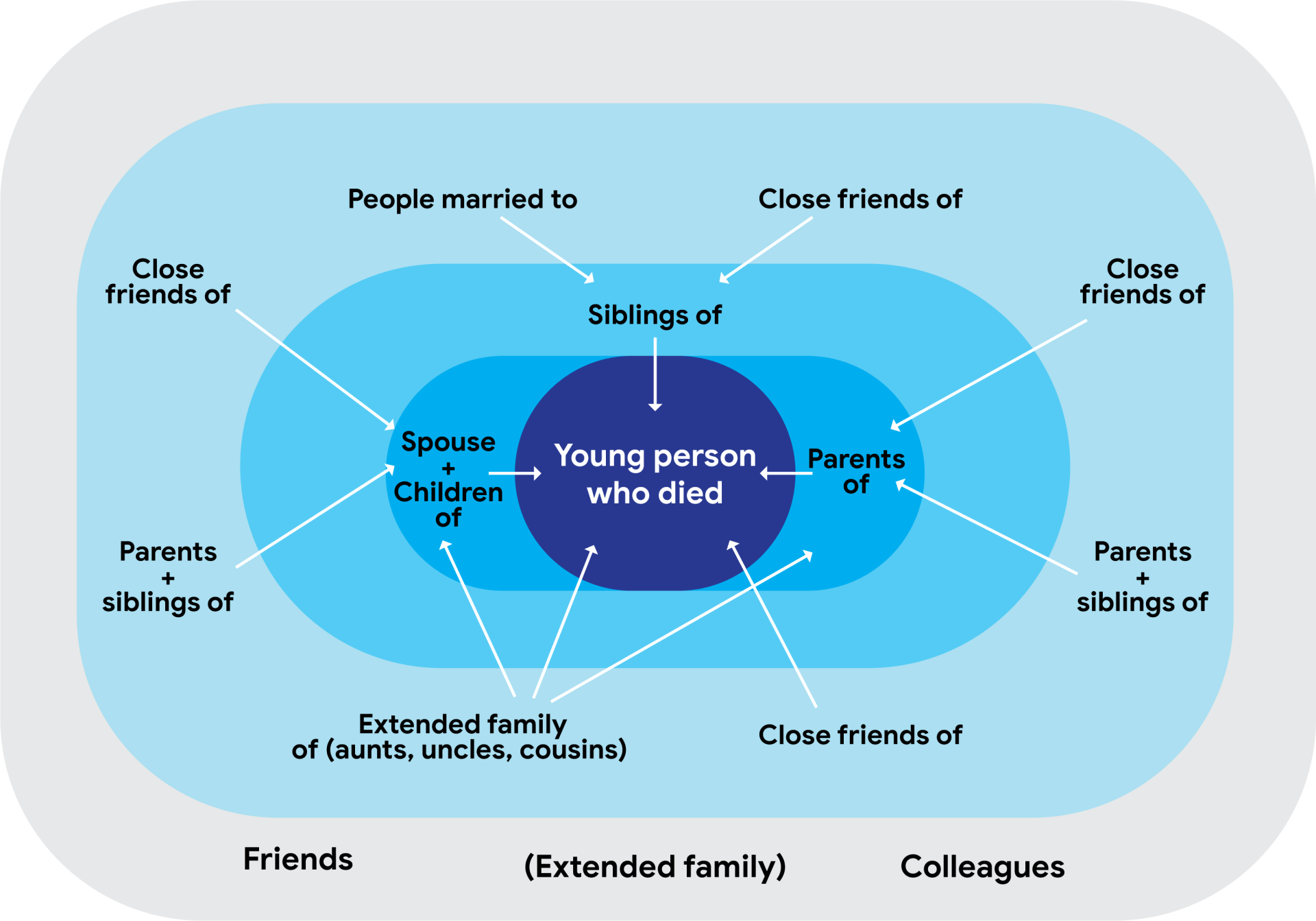For Your Widow Friends
I know from personal experience what sudden death feels like to the person it affects and the upheaval it creates in their life. I also know acutely how ill-prepared friends, families and communities are to come to the aid of the widow left behind. It’s OK. I’m here to help.
Most widows go through a lengthy period of loneliness and isolation following the death of their spouse. Funerals provide a sense of closure for most people, and they carry on with their lives. But for the widow of sudden death, their life is frozen in time and the painful and lonely journey towards understanding and healing has just begun. They need friends and family like you to ease their sorrow and their burden, but often their supporters are nowhere to be found. The widow experiences awkwardness and avoidance from others, which leads to their abandonment in her time of need.
We have a lot to learn, but it doesn’t have to be difficult.
Below you’ll find a handy diagram which will help you to determine your role in the widow’s grieving process. Then, I’ll go into the basics of what I call Death 201 - the classic mistakes people make once someone is widowed, and what we, the bereaved, wish they would say and do instead. I include a handy list of chores you could help your widow friend with, and the best way to do so. I’ll also let you know how you can give her the number one thing she needs.
Understanding Grief
I can empathize with the fear people have towards approach the grieving, because we are not all cookie cutter survivors, and there is no magic recipe of support. Death is complicated! Everyone has their own way of grieving and what they prefer for people to say and do. The coping strategies of the survivor also come into play. Some of us can’t get past the loss, forever stuck in the quicksand of grief, unable to pull ourselves out. Some of us see the gift, maybe not right away but usually after some time – using the experience to learn and grow. It may be impossible to predict which category we survivors will fall into. Everyone grieves differently, on a different timetable. Even the survivors can’t always relate to one another’s stories – having had different life experiences and different living situations. And remember, the grieving have good days and bad. They can be making progress, but then have a set-back. Expect their emotions to be inconsistent. Don’t judge them, and don’t give up on them! The fact remains, all of them need support to make it through their bereavements, and, with guidance, it can be easier than people think.
What Can You Do?
Psychologist Susan Silk developed the Ring Theory of Grief - a diagram that helps people understand what their role is during times of loss and grief. Which ring we fall into depends how close we were to the deceased. Those who suffer the greatest impact of the trauma (in the smaller rings, closest to the centre), should be the ones who receive the most support from those around them (in the larger rings, farther out). The concept is “comfort in, dump out”. This means the people in the smaller rings can dump their feelings outward onto the people in the outer rings and the people in the outer rings send their comfort inward to those in the smaller rings.
People naturally expect the widow’s close family is helping her, but that’s not always the case. When our spouse dies young, our husband’s parents and siblings are grieving right alongside the widow. In my case, both my parents were already deceased so I had no close family that could parachute in and help. Stands to reason that the people in our outer rings play an important role in our recovery and are actually more valuable to us then they think.
I have rewritten the ring theory diagram, gearing it more specifically to the sudden death of a young person in their prime. See where you fall in this diagram, and send your comfort inward.
DEATH 201
You know the old saying, “You really find out who your friends are”? Widows say it all the time. If you want to know how to be a good friend to the widow, keep reading. There are several common things people say and do that aren’t especially helpful to those of us that are grieving. People don’t intentionally set out to say and do the wrong things, but it happens. Some, or all, of the below may pertain to them. You’ll know them when you see them. I call this Death 201.
Not Saying Anything At All
When confronted with the widow out in public, people are often afraid to acknowledge her loss for fear that reminding her will make her sad (and them uncomfortable). So, instead of bringing it up, they say nothing, and engage in meaningless conversation. Her husband died young – an unnatural occurrence by everyone’s standards – and it doesn’t even get acknowledged? And trust me, you can’t remind her about what she’s lost and make her sad. She thinks about it all the time. You won’t get the blame. Ironically, it’s your not saying anything that makes her sad. By trying to ‘spare her feelings’, you are actually being dismissive and it dishonors the deceased and her pain. If anything, she LOVES talking about her loved one and remembering them. It makes her feel good. By all means, she even wants to hear your favorite story about them. That’s the best, a surprise gift.
Acknowledging the loss doesn’t need to be uncomfortable. You could just say, “I was so sorry to hear about (insert deceased’s name here)”, or “I’m sorry for your loss, by the way”. It’s that simple. It’s like the ice breaker joke at the party. Say it once and we can all breathe a sigh of relief and move on. Now you can talk about meaningless things like the weather.
And consider this: if you don’t say anything, she’s faced with the pain of informing you, a burden she doesn’t really need. Then when you say, “I know, I heard”, it makes her burden worse.
But if she does cry, please, don’t take it personally. Crying is a good thing – a little release, right? Nothing is required of you if she cries. You don’t need to feel uncomfortable or compelled to make her feel better (spoiler alert: you can’t). It’s OK to just stand there and wait (looking sympathetic, of course). If you need something to do, dig in your purse for a tissue and then, when she stops her little cry, you can resume your conversation. Or, maybe you could say, “Awww” – that’s a great word. At least it shows compassion. She doesn’t necessarily expect you to know what to say. She doesn’t expect you to fix anything. In fact, if she cries, she’s going to be apologizing to you, trying to make you feel better!
Maybe it’s been a long time since her spouse died, maybe a year or two even, and this is the first time you’re seeing her? Maybe you’re thinking, “that was so long ago, I can’t possibly say something now”. Wrong - sorry, no pass. The first time you see her, no matter how long after, she expects you to say something. There is no statute of limitations on condolences.
Let Me Know If You Need Anything
Ah, the classic “let me know if you need anything”. We’ve all said it. Most of us really mean it. We aren’t sure what we could do to help, as everyone is different in what they might want or need, so we throw out the blanket offer. The problem is, no one really likes asking for help, even on a good day. Besides, your widow friend will likely draw a blank at the exact moment you ask, but trust me, later she will think of a whole host of things. When you’re grieving, you’re undergoing something physically and mentally taxing every waking second of the day. Asking for help becomes one more thing on the endless ‘to do’ list. If you put yourselves in the survivor’s shoes and think about the role that the dearly departed played in her household, you begin to realize everything the deceased used to do now has to be done by her. It’s a learning curve and she needs help.
The best way to think about how you can help the widow is to think of her in terms of what she is now: She is primarily a single parent. What does this mean?
It means she is a mom AND a dad, and it means she has her kids 24-7.
As both mom and dad, think about what it would take for her to fill her husband’s shoes, replacing the role he had in their partnership. She now has to figure out how to take all that on, either by doubling her workload, hiring someone to do it, or neglect those duties entirely. As someone who has her kids 24-7, think about what that means. She has no time to herself to grieve her husband, she has no time for self-care, she has no spouse to hand the kids off to - ever.
Also, try to imagine your widow friend making life altering decisions, attempting to piece her shattered life back together, with what I call Widow Brain. It’s like pregnancy brain, but worse because it’s the result of a tragic event rather than a happy one, and it takes much longer to go away. It’s a combination of heavy fog, fatigue, and being overwhelmed - a surreal bubble of utter blankness.
Widow’s Checklist
If you really want to help your widow friend, then help. Make help a verb, not a noun. And don’t just ask her once and give up. Check in daily, or weekly, monthly, or seasonally. Do something for her that you know must
need doing.
To make this even easier, I’ve compiled a handy list of things people in the widow’s outer circles can do. It’s not exhaustive, but it stimulates the thinking. Some things help her with her spouse’s role, others just keep her sane.
- Pick up the phone and call.
- Send a text.
- Send meals (past the first week, when most everyone else has stopped but she’s still hungry and too worn out to cook).
- Invite her over for a meal and say it’s ok to come in her pyjamas.
- Walk her dogs. They need it daily. This could be shared by multiple folks.
- Wash her dishes or do her laundry. Also a recurring condition.
- Help with yard work - mow the lawn, rake the leaves, shovel the snow, clean out the eavestroughs. If it’s summer, pick up a propane tank for the BBQ (they’re heavy).
- Help her get her yard (or cottage) ready for winter (or summer).
- Babysit.
- Have her kids over. Take her kids along with your kids wherever they’re going, or even for a sleepover, so she can be home alone and grieve, not having to be strong every waking minute.
- Pick her kids up from school or activities; drive them to school or activities (once they get back to routine).
- Throw the ball around with them (or whatever practice they may need).
- Attend her kid’s sporting events or activities. Let them know they are supported.
- Come over with a bottle of booze.
- Let her talk (or cry, or both) if she wants to – you just listen.
- Let her bitch/debrief/complain. Grief = Anger.
- Invite her to parties, or whatever you used to. Don’t avoid her.
- Take her kids out shopping for her birthday or Christmas. Kids feel bad when they don’t get mom anything, but guess what? They don’t drive.
- Help her fix things – lights burn out, appliances fail, stuff goes wrong with her car.
- Help her clean and declutter – even if you just keep her company while she does. It motivates her. (Don’t forget that bottle of booze.)
- Help her go through her husband’s garage stuff. What is worth keeping (that she might need)? What is crap and should be tossed? What can she sell off and for how much?
- Help her list stuff for sale and screen the buyers for her. Better yet, give them your address for pick up. Single women with children don’t want strangers coming to their house and scoping the joint.
- Help lift heavy things that she will want to throw out. You’d be surprised at how often she just needs another pair of hands.
- Lend her your truck to purge.
- Recommend reputable handy men or companies that she can hire for yard work, snow clearing, etc.
Saying, “Let me know if you need anything”, is a great gesture in theory, but do you really think the widow is going to call you up and say, “Can you come and walk my dogs now” or “Remember when you said you would…..so, when are you coming?” Maybe some would, but most won’t. So, rather than the blanket offer, it would be better to offer the widow something more concrete, like, “I’d love to help you with the dogs. I’m free on Fridays at 9 am, would that work? Do you want me to come over when you’re at home, or can you give me your garage code?” This kind of arrangement is great in case they don’t feel like showering or getting out of bed that day! Or say, “I have two hours free this Saturday. I could come at 11am and help you with your laundry/dishes/cooking/yard work. Does that work for you?”
Taking Your Spouse For Granted
Don’t do it, Ladies. Don’t complain to your widow friend about your man. She doesn’t want to hear it. To be fair, you probably don’t even realize you’re doing it – it’s so natural for all of us to take each other for granted. The mundane and petty things you find aggravating about your spouse, she wishes her spouse was still doing to her. In fact, you should go give your husband a hug right now.
Make sure you understand the gift you have in co-parenting. Your widow friend is responsible for her kids 24-7 now and doesn’t have the luxury of passing her kids off to her spouse - ever - so she can go out for drinks with you, or go get her nails done, or run that errand while her husband takes the kids to their activities.
The Bottom Line – The Number One Thing the Widow Needs
The widow needs people not to ignore and avoid her. She needs people to include her. She needs people to touch base and check in with her. She needs people to figure out for themselves what a single parent must need, not expect her to ask. She needs people to understand what a women might have a hard time doing on her own. She needs people to get it, even when they didn’t. Ultimately, it all boils down to this: the number one thing the widow needs is a Death Squad - people that will check in regularly, so she doesn’t feel all alone.
A Death Squad is like a little army of helpers - comprised of family and friends in the widow’s outer circles who get in touch, sit with her, help with chores, make a meal, just be there. A Death Squad can coordinate its “members” behind the scenes and arrange to come over as a group. Together, you can sit with the widow and assess the void that the deceased left in her household and construct a plan to help her get through the next few months, or seasons. It’s common to get together with family and friends when we plan the funeral, doling out certain tasks. People are happy to help in such a trying time. However, as soon as the funeral is over, that help ends. Help the widow make a similar plan in the weeks and months that follow, and with a coordinated squad, no one person has to take on too much. The rational minds of a Death Squad can help the woman with widow brain think of things she might overlook, things she didn’t even know her husband took care of. A plan is comforting, and helps the unknown days ahead feel less scary for her. She should meet regularly with her Death Squad and update the plan as needed. Once some things are handled, or she has learned how to do them herself (or has hired someone to), the Death Squad’s focus may change. Or, with any luck, it can disband, because she will be in a much better place. And you’ll feel good, knowing you helped her get there.
Lisa

Death makes everyone uncomfortable. At least nowadays it does. People don’t want to talk about it before it happens, never mind afterwards. It hasn’t always been this way. In our great grandparents day, death was considered as much a part of life as birth, and comfort with death was natural. People died at home and their bodies were placed in the parlor for days, allowing visitors to view the body and pay their respects. We took care of our deceased with pride. Advances in modern medicine and the inception of funeral homes changed all this. People began surviving previously non-curable diseases and living longer. Physicians considered it a failure to have a patient die, and going into the hospital for life saving measures during our final days became the norm. Funeral homes made death a profession, a business transaction. Passing away was now dealt with off stage by strangers, removing it from our sight and our minds. We lost the personal touch in caring for our loved ones ourselves - both those that have died and those that are suffering someone’s death. Death sucks, but by hiding from death and lacking experience with death, we end up fearing the unknown. Now, that sucks.
BACK TO BLOG




